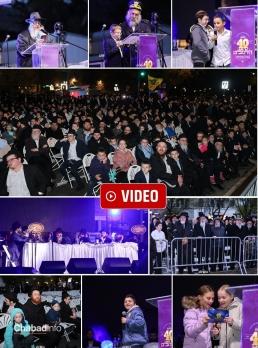Are “Comparative Religion Studies” Acceptable?
Question: I’m a Lubavitcher Chassid who serves as principal in a non-Chabad community day-school in the Midwest. Most of our board members are traditional Jews with a liberal slant. There has been a recent push by the board to introduce into the school curriculum “comparative religion studies” where the students explore the origins of other religions (including Christian) in addition to, l’havdil, Judaism. I am strongly opposed to this idea and was wondering if the Rebbe gave guidance on this particular topic. Rabbi Gershon Avtzon answers in this week’s Chinuch and Moshiach column • Full Article
Question: I’m a Lubavitcher Chassid who serves as principal in a non-Chabad community day-school in the Midwest. Most of our board members are traditional Jews with a liberal slant. There has been a recent push by the board to introduce into the school curriculum “comparative religion studies” where the students explore the origins of other religions (including Christian) in addition to, l’havdil, Judaism. I am strongly opposed to this idea and was wondering if the Rebbe gave guidance on this particular topic.
Answer: This is a very important topic, and the Rebbe’s position is clear and unequivocal: It is completely forbidden, as it is connected to Avodah Zara and must be strongly negated. The following are a few letters on this subject:
(1) Rabbi Asher Abramason was a rav in Sydney, Australia. In 5726 (1966), the Government of Australia mandated the teaching of “General Religious and Moral Education” courses. He wrote two questions to the Rebbe: (a) Does learning such material negatively affect the soul of the Jewish children? And (b) if yes, is he obligated according to Halacha to take legal action against this in the courts?
The Rebbe responded thus:
(a) “It is obvious that this material being learned is biblically forbidden as explained by the great codifier the Rambam (Chapter II of the Laws of Avodah Zara). If so, not only is the learning of such material damaging to Jewish children, but this is connected to Avodah Zara which we are supposed to stay clear of anything even remotely connected to it.
(b) The above leads quickly to the conclusion that you are obligated according to Halacha to go to court and to do your utmost to legally challenge these requirements. It is certain that when you will explain the concept truthfully and forcefully, your position will be accepted. The courts must understand that this is something which deeply affects our religious faith and belief which is something that the Jewish people have sacrificed their lives for over the generations.
All enlightened nations in democratic societies of the world do not believe in forcing people to go against their faith chas v’Shalom, and not even to burden the free exercise of religion and its practices.” (Likkutei Sichos Vol. 37 p. 198; Igros, Vol. 24 p. 143: #9145)
Interfaith Dialogue
[The following letters of the Rebbe don’t address the question of comparative religion studies at schools specifically, but speak of the topic from another angle — interfaith dialogue and debates and help understand the Rebbe’s approach to the question at hand even better.]
(2) “Regarding participation in dialogue (about comparative religion):
If there is any slight concern (that it could lead to interest in other religions), why should you even enter such discussions? Especially as regards something (like Avodah Zara) which we need to be so careful to avoid even a remote connection to and especially in our era.. (Igros, Vol. 26 p. 32: #9688)
(3) In 5730, Rabbi Adin Even-Yisrael (Steinsaltz) was invited to a debate that would discuss different religions to represent the Jewish (Torah) perspective on certain religious matters. He wrote to the Rebbe about it and was told to refrain from participating and to encourage others not to participate as well.
The Rebbe then addressed an important question: If we refrain from engaging in public discussion or debate, the people will only hear the other side (other religions) without a chance to hear the Torah perspective. Is that not counter productive?
The Rebbe’s response was thus: “To deal with this issue, we do not need to have discussions and debates, especially with serious halachic questions if they are at all permissible … The solution is to create public forums and lectures that discuss the foundations and basic principles of our holy faith. It should also be explained to them that the Jewish approach is not to be ashamed or embarrassed just because there are scoffers. It should be “words spoken from the heart,” which thereby “will enter the heart.”
The Rebbe adds the following very important point: (When giving these public lectures), “do not confuse the listeners with introductions [of foreign beliefs or ideas], even if the intention is to refute those claims and beliefs.” (Ibid, p. 88-89; #9733).
The Moshiach Connection
The Rambam (Hilchos Melachim 11:4) explains the reason for the spreading of the other religions, and how it is all connected with preparing the world for Moshiach!
In his words:
“The founder of Christianity who aspired to be the Moshiach and was executed by the court was also alluded to in Daniel’s prophecies, as stated: ‘The vulgar among your people shall exalt themselves in an attempt to fulfill the vision, but they shall stumble.'”
“Can there be a greater stumbling block than Christianity? All the prophets spoke of Moshiach as the redeemer of Israel and their savior who would gather their dispersed and strengthen their observance of the mitzvos. In contrast, Christianity caused the Jews to be slain by the sword, their remnants to be scattered and humbled, the Torah to be altered, and the majority of the world to err and serve a god other than the L-rd.
“Nevertheless, the intent of the Creator of the world is not within the power of man to comprehend, for His ways are not our ways, nor are His thoughts, our thoughts. Ultimately, all the deeds of Yeshua of Nazareth and that Ishmaelite who arose after him will only serve to prepare the way for Moshiach’s coming and the improvement of the entire world, motivating the nations to serve G-d together as Tzephaniah 3:9 states: ‘I will transform the peoples to a purer language that they all will call upon the name of G-d and serve Him with one purpose.”
“How will this come about? The entire world has already become filled with the mention of Moshiach, Torah, and mitzvos. These matters have been spread to the furthermost islands to many stubborn-hearted nations. They discuss these matters and the mitzvos of the Torah, saying: ‘These mitzvos were true, but were already negated in the present age and are not applicable for all time.’Others say: ‘Implied in the mitzvos are hidden concepts that can not be understood simply. The Moshiach has already come and revealed those hidden truths.’
“When the true Messianic king will arise and prove successful, his position becoming exalted and uplifted, they will all return and realize that their ancestors endowed them with a false heritage and their prophets and ancestors caused them to err.”
66
Join ChabadInfo's News Roundup and alerts for the HOTTEST Chabad news and updates!











































